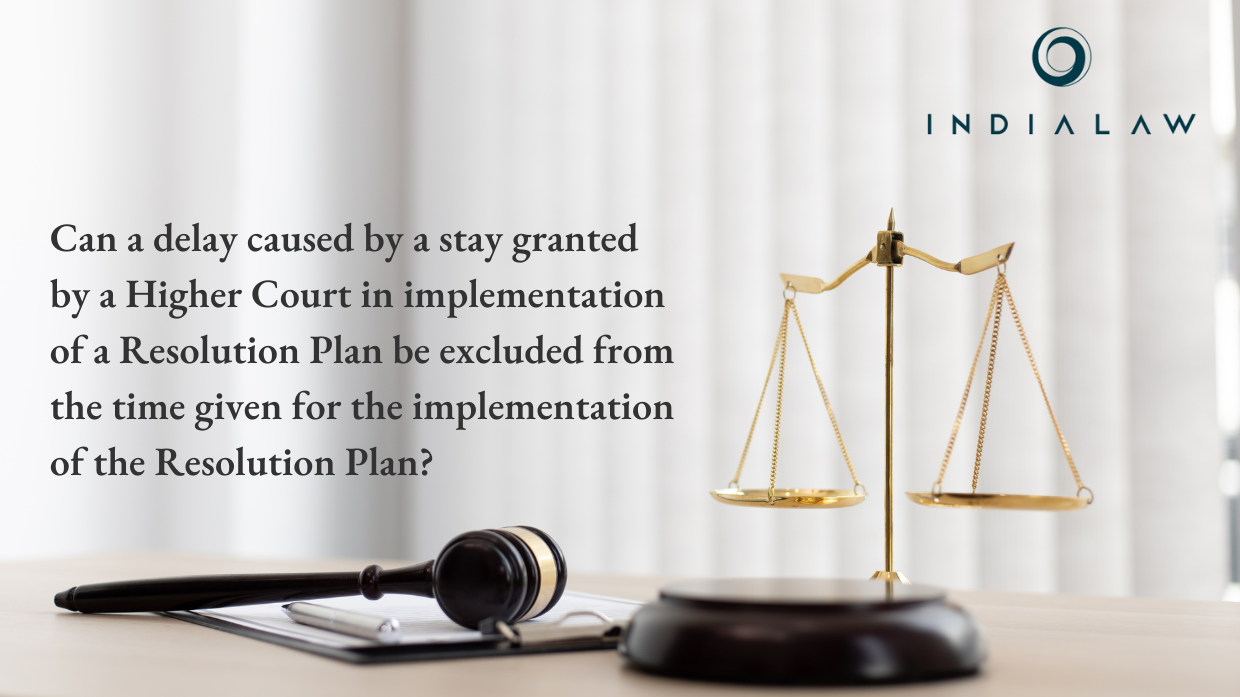Can a delay caused by a stay granted by a Higher Court in implementation of a Resolution Plan be excluded from the time given for the implementation of the Resolution Plan?

Introduction:
In the matter of Majestic Auto Limited v. Sharan Hospitality Pvt Ltd. & Anr.[i], the Hon’ble NCLAT held that when a Higher Court grants a stay order which puts an embargo on implementation of the Resolution plan, such delay can be excluded from the time period stipulated for the implementation of the Resolution plan.
Table of Contents
Facts:
Subsequent to the admission of M/s Sharan Hospitality Pvt. Ltd.(Corporate Debtor) into insolvency on 08.05.2019, the Appellant emerged as the Successful Resolution Applicant (SRA) and the resolution plan was approved by the Committee of Creditors(CoC) and the Adjudicating Authority on 30.01.2020 and 15.04.2021 respectively.
The resolution plan provided that it would be implemented following the vacation of the Order dated 13.11.2018 and 27.09.2019 passed by the Hon’ble Delhi High Court in an application filed by Daiichi Sankyo Co. Ltd., seeking the impleadment of garnishees to execute a decree held against the promoters of the Corporate Debtor. Vide Order dated 13.11.2018 and 27.09.2019, the HC directed the garnishees, including the Corporate Debtor, from creating any third-party rights in the immovable properties.
Consequently, the Resolution Professional of the Corporate Debtor filed E.A. No. 898 of 2021 before the Hon’ble Delhi High Court, seeking the vacation of the aforementioned orders. On 28.10.2021, the Hon’ble Delhi High Court vacated these orders, stating that the restraint would not apply to the implementation of the resolution plan as approved by the Adjudicating Authority on 15.04.2021.
Aggrieved by this order, Daiichi Sankyo Co. Ltd. moved a Special Leave Petition (SLP) before the Hon’ble Supreme Court, and the Apex Court granted an interim stay via Order dated 13.12.2021.
Consequent to the stay order granted by the Hon’ble Supreme Court, it was asserted that the SRA-Appellant was not in a position to execute the resolution plan and therefore filed I.A No. 266 of 2023 seeking exclusion of the period from 13.12.2021 being the date on which interim stay was granted by the Hon’ble Apex Court until the date of filing of the I.A. No. 266 of 2023 from the 18 months’ time frame provided for commencement of the implementation of the resolution plan.
Simultaneously, the Respondent 2 – Axis Bank filed an application seeking liquidation on account of non-implementation of the resolution plan. The Adjudicating authority dismissed the Application filed by the Appellant and approved liquidation of the Corporate Debtor. Subsequently, the appointed Liquidator took into his custody and control all the assets and properties of the Corporate Debtor. Aggrieved by this impugned order, the Successful Resolution Applicant has preferred this appeal.
Contention of Both Parties:
The Counsel for Appellant contended that the non-implementation of the resolution plan in compliance to the order of the Apex Court granting stay cannot be considered as a breach of plan by SRA. It was added that the impugned order violates the well-settled principle of law that “the act of the court shall harm no man” as has been laid down by the Hon’ble Supreme Court in Arcelor Mittal Pvt. Ltd. v. Satish Kumar Gupta & Ors. (2019) 2 SCC 1.
The Counsel for Respondent contended that the 18 months period for implementation of the plan included the time period required for vacation of the court orders. It was further contended that prompt action was necessary to preserve the value of assets. Thus, after non-implementation of the plan for 21 months, the Respondent’s actions seeking direction from the adjudicating authority in terms of Section 33 of the Code to initiate liquidation process was justified.
Decision of the NCLAT:
The Hon’ble NCLAT found that the SRA was correct in taking a stand that it was necessary to await the final decision of the Apex court before the implementation of the plan.
The Hon’ble Appellate Tribunal held that the delay in implementing the resolution plan was anticipated and provided for in the approved resolution plan. This delay, caused by a stay granted by the Supreme Court, does not constitute a violation or willful non-implementation of the plan by the Successful Resolution Applicant (SRA).
The NCLAT ruled that the Adjudicating Authority overstepped its jurisdiction by initiating the liquidation of the Corporate Debtor without waiting for the Supreme Court’s final decision. The Supreme Court must determine whether the Corporate Debtor’s assets will go to Daiichi or remain within the resolution process. Until then, the Adjudicating Authority cannot preemptively deal with these assets, making the impugned order both perverse and illegal.
The Hon’ble NCLAT further observed that Regulation 39(9) of the IBBI Regulations, 2016, on occasion of non-implementation of the plan, gives the Creditor the liberty to seek directions from the Adjudicating authority. However, it did not agree that these directions under the Regulations can only mean ordering liquidation.
It further stated that Section 33 of IBC outlines the grounds for liquidation of the Corporate Debtor and held that “when none of the pre-requisite conditions required to be fulfilled before undertaking liquidation process are met, in such circumstances, the Financial Creditor cannot use the forum of the Adjudicating Authority to force liquidation of the Corporate Debtor”.
The Hon’ble NCLAT observed that “it is also a settled law that when a higher court grants a stay which stalls the implementation of the resolution plan, the said period can well be excluded from the time period given for implementation of the resolution plan.”
Thereby, the Hon’ble NCLAT set aside the order allowing liquidation of the Corporate Debtor and further directed the Adjudicating Authority to allow exclusion of the aforementioned time.
[i] Company Appeal (AT) (Insolvency) No. 51 of 2024
By entering the email address you agree to our Privacy Policy.



